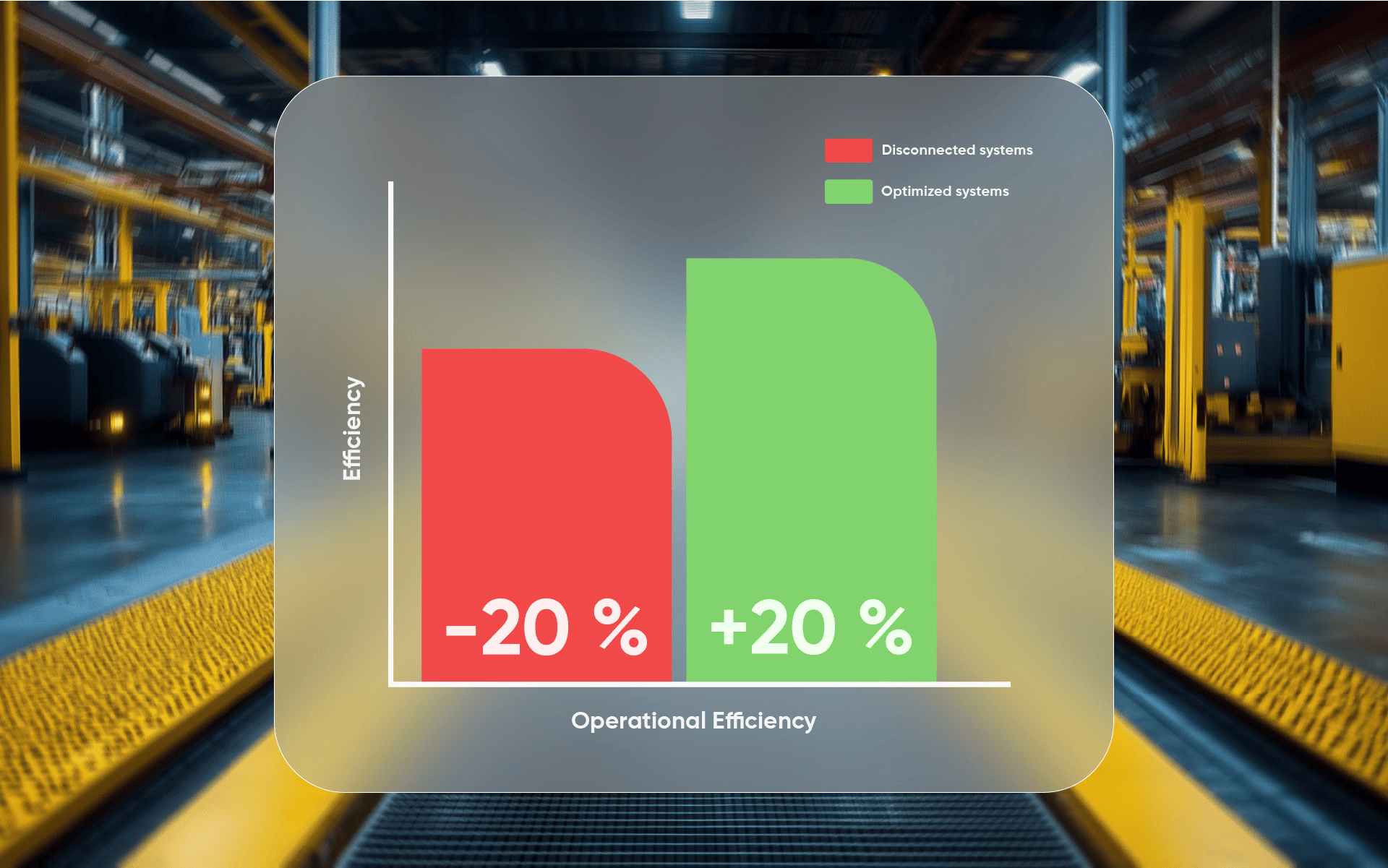Productivity is the lifeblood of manufacturing. And miscommunication and chaos in data easily kill it. Both of these lead to missed deadlines, manufacturing errors, and unhappy customers. Don't higher your cost, work smarter with CRM.

The role of CRM in the manufacturing sector is incredibly important. This system is essential for every business team in this industry.
If you're looking to improve your productivity and effectively face common manufacturing challenges, you must start using CRM.
Let's list the challenges, see how dangerous they might be, and find solutions together.
Table of contents:
Common Manufacturing Productivity Challenges
The Hidden Costs of Inefficiency
Strategies to Boost Manufacturing Productivity
CRM as a Power Tool in the Manufacturing Sector
Implement a CRM into Your Business
Be Effective and Productive
Common Manufacturing Productivity Challenges
Miscommunication is only one of several obstacles manufacturers face. But there are many more:
- Disorganized manufacturing data
Without centralized access to real-time data, team members waste hours searching for specifications, production schedules, or customer information. This causes issues. Such as the inability to meet deadlines, reduce downtimes, or eliminate waste.
The bottom line here is a reliable system that helps to increase efficiency. And gives managers, including project managers, all the needed space to improve team collaboration in manufacturing.
Manufacturing data today plays a huge role in business productivity and efficiency.
- Lack of visibility across the manufacturing system
Departments often operate in silos, which makes it difficult to coordinate efforts.
For example, if production isn't in sync with inventory management, you may end up with surplus stock. Or worse, delays in one or more production lines.
- Inefficient team collaboration
Teams relying on outdated tools, such as spreadsheets and email chains, find it challenging to keep workflows synchronized.
This slows decision-making processes and creates frustration when tasks fall through the cracks.
Find yourself a management system that will be a fit and avoid all these complications.
- Human errors in production
Manual processes increase the risk of mistakes, from incorrect material usage in the shop floor to mislabeling. These errors not only cost money but can also damage a company's reputation.
Reduce your waste and costs effectively with automation.
- Technology gaps in the production floor
While automation and IoT have revolutionized manufacturing, many businesses still rely on outdated machinery or software. Using old technology can be an issue because it often fails to integrate with other systems.
Each of these challenges stems from one core issue: a lack of streamlined systems to unify teams, data, and processes. Addressing the inefficiencies above is critical for you as a manufacturer to stay competitive.
The Hidden Costs of Inefficiency
Imagine a single error in communication leading to a production delay. That delay disrupts your delivery schedule, which in turn causes unhappy customers.
And, unfortunately, the ripple effect doesn’t end there:
- Missed deadlines - Your clients may lose trust in your ability to deliver on time, which won't allow you to increase your product sales.
- Negative effects of overwork - Fixing errors takes time and costs more resources.
- Team morale suffers - Frequent setbacks can lead to burnout and lower productivity of your team.
Now multiply this scenario across multiple departments or projects. Over time, these inefficiencies compound, costing you not only revenue but also opportunities for growth.
Learn how to reduce manufacturing errors with specific strategies to boost productivity in manufacturing businesses.

Strategies to Boost Manufacturing Productivity
How to improve productivity in the manufacturing business? It's not just about working harder. It’s about working smarter. To combat inefficiency, manufacturers need to adopt a multi-faceted approach that includes:
- Investment in training
A well-trained workforce is the backbone of any efficient operation. Regular training on new technologies ensures your team is equipped to meet the demands of modern manufacturing.
- Streamlining supply chain management
Working closely with suppliers and using tools to track inventory in real-time helps prevent delays. This ensures a smooth production process and highers efficiency in manufacturing.
- Leveraging automation
From assembly lines in manufacturing facilities to administrative tasks, automation reduces human error and speeds up workflows. For example, automating follow-ups with suppliers or customers ensures nothing falls through the cracks.
- Implementing lean manufacturing principles
Lean methodologies, such as minimizing waste and optimizing resource use, can significantly enhance productivity. Regularly reviewing your processes to eliminate inefficiencies is key to staying agile.
- Adopting the right technology
Investing in integrated tools for manufacturing productivity, such as CRM, will bring the sweet fruit in every area of your business.
CRM as a Power Tool in the Manufacturing Sector
A Customer Relationship Management (CRM) system isn't just for sales or marketing teams. For manufacturers, it serves as a centralized hub that improves productivity, enhances collaboration, and facilitates data-driven decision-making.
Here’s how a robust CRM like eWay-CRM for Outlook can transform your manufacturing operations:
- Centralized communication
Say goodbye to scattered emails and fragmented communication. eWay-CRM for manufacturing industries allows you to save and organize all correspondence automatically. Whether it’s a client inquiry or a supplier update. Everything is linked to the relevant contact, company, or deal.
- Improved team collaboration
With centralized data, teams across departments can stay aligned on priorities, deadlines, and workflows. Everyone has access to the same information, reducing the risk of misunderstandings.
- Enhanced workflow automation
Automate repetitive tasks and reduce human error. Plus, free your team's hands. Then, they'll be able to focus on strategic initiatives.
- Useful insights from manufacturing data
CRMs provide a holistic view of your operations by integrating data from various sources. This enables you to monitor trends, identify bottlenecks, and make informed decisions to improve efficiency.
Implement a CRM into Your Business
Now, that you know the solution for manufacturing inefficiencies, it's time to implement a fitting CRM:
- See your needs
Identify the specific inefficiencies in your current operations. Are communication gaps your biggest challenge, or is it the lack of data visibility - e.g. U.S. manufacturing data?
- Choose the right CRM
Look for a system that integrates seamlessly with your existing tools, such as Outlook or ERP software.
- Train your team
Ensure your employees understand how to use CRM effectively. And how to work with it when it's integrated with other types of manufacturing systems. Offer ongoing support to help them adapt to the new system.
- Measure your success
Set clear KPIs, such as reduced lead times or improved on-time delivery rates, to track the impact of the CRM on your operations.
Be Effective and Productive
Implement a CRM into your processes and let your manufacturing business strive.
eWay-CRM for Outlook offers manufacturers all they need. It centralizes communication, streamlines workflows, and provides actionable insights, making it a vital tool for improving productivity.
Be productive—keep all customer communication in one place with eWay-CRM for Outlook. Schedule a demo today!











